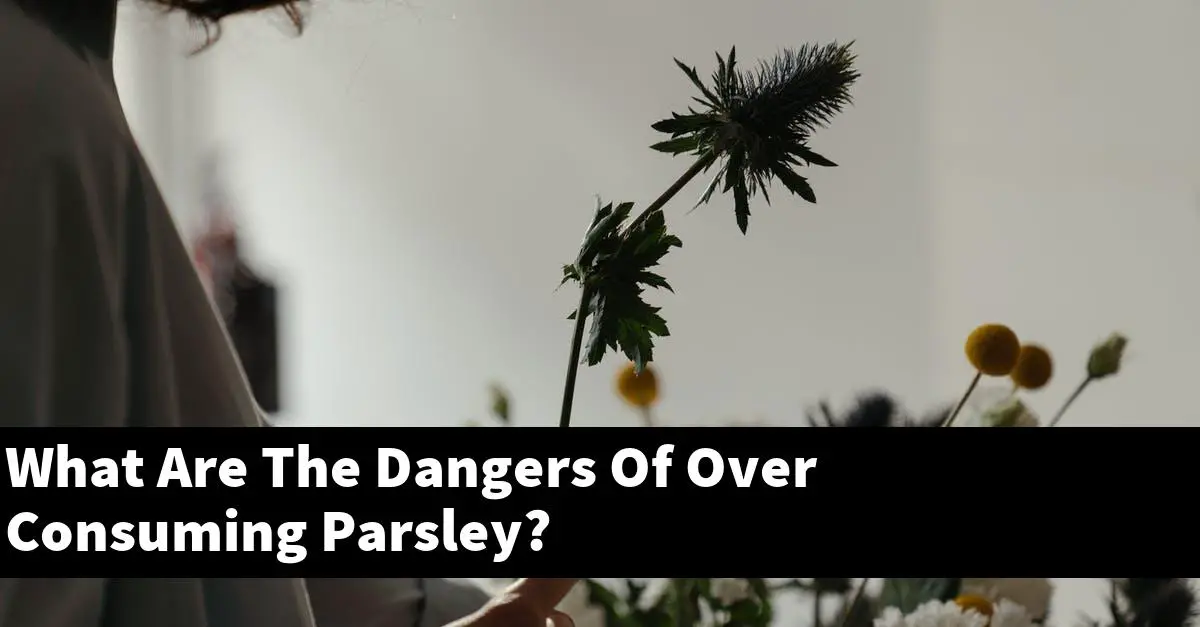Parsley is a herb that is often used as a garnish or as a decoration on plates of food. While it may be safe to consume parsley in small amounts, consuming too much parsley can be dangerous.
Parsley is a source of oxalates, which can bind with calcium and other minerals in the body and form kidney stones. Consuming large amounts of parsley can also lead to gastrointestinal upset, including nausea, vomiting, and diarrhea.
Is it safe to eat too much parsley?
Parsley is a herb that can be eaten in small amounts without any harm. However, if you eat too much parsley, it can cause digestive problems.
What are the dangers of parsley oil during pregnancy?
Parsley oil is a near-essential oil derived from the parsley plant. It is considered to be safe to use during pregnancy according to the US National Institutes of Health.
However, there are some potential dangers to be aware of.
One potential danger is that parsley oil can cause contractions. Parsley oil is also known to increase blood flow, which can lead to uterine bleeding.
In extreme cases, parsley oil can cause premature labor.
It is also important to note that there is no evidence that parsley oil is harmful to the baby in small amounts. However, it is always best to speak with a doctor before using any type of oil or supplement during pregnancy.
Can you get a vitamin k overdose from parsley?
The vitamin K found in parsley is not toxic in high doses, but it can cause nausea and stomach upset if ingested in large quantities. There is no evidence that parsley can cause a vitamin K overdose.
What are the side effects of parsley cutters?
Parsley cutters can cause skin irritation and a burning sensation. They can also lead to cuts and bruises if the user is not careful.
Parsley cutters can also cause breathing difficulties if the user is not careful.
Is eating parsley everyday good for you?
Parsley is a member of the mint family and is believed to have antibiotic and anti-inflammatory properties. It has also been shown to be a detoxifier and to help reduce blood pressure.
Parsley is also a good source of vitamin A and K, as well as folate and vitamin C.
How much parsley tea is safe to drink daily?
It depends on the individual’s tolerance to parsley and other herbs. A safe guideline is to drink no more than 1 cup of parsley tea per day.
How much parsley can you eat daily?
Parsley is a popular herb used in many Mediterranean dishes. The leaves and flowers of the parsley plant can be eaten fresh or dried.
The leaves are most commonly used and have a flavor similar to celery. The flowers are used in Mediterranean cuisine to add a distinctive flavor to dishes.
Parsley can be eaten fresh or dried, and the amount that can be consumed daily depends on the sensitivity of the individual. Generally, a small amount (about a teaspoon) of parsley can be eaten daily.
Parsley can also be used in cooking, and the amount used depends on the recipe.
How much parsley is toxic?
Parsley is not toxic.
How much parsley is safe to eat daily?
It depends on a person’s individual tolerance level for parsley. Generally, parsley can be consumed in moderation, as long as it is not over-consumed.
However, some individuals may experience adverse effects, such as stomach upset, if they consume too much parsley. It is always important to consult with a healthcare provider before beginning a new diet or supplement regimen, as there is always a potential for negative side effects.
Does parsley cause blood clots?
Parsley is a member of the cabbage family and can contain levels of a compound called coumarin that can cause blood clots. Coumarin is a chemical that is found in many plants and can be harmful if ingested in large quantities.
Coumarin can also be harmful if it gets into the bloodstream and causes blood clots.
Conclusion
Parsley is a herb that is commonly used in cooking. It can be consumed fresh, dried, or powdered.
While parsley is generally considered to be safe, there are some potential dangers associated with consuming too much of it. Parsley can act as a diuretic, which can lead to dehydration if not enough fluid is consumed along with it.
It can also interfere with certain medications such as blood thinners and lithium. Consuming large amounts of parsley can also cause nausea and vomiting.
Therefore, it is best to moderation when consuming parsley.

